
Turning Off Two Factor Authentication On iPhone 13 Pro Max? 5 Tips You Must Know

Turning Off Two Factor Authentication On Apple iPhone 13 Pro Max? 5 Tips You Must Know
Apple has produced one of the most consumed, acknowledged, and preferred smartphones that allowed them to rule the industry for a considerably long period of time. Their style and presentation were not the only reason that made people look forward to buying an iPhone. Apple created its own operating system and presented their own versions of security and protection. One of the most recognized and impeccable features offered by Apple in its innovative structure was the security and safety through Apple ID and Apple Account. Every important feature that operated throughout the Apple iPhone 13 Pro Max or iPad was focused over a single entity, the Apple ID. However, apart from the Apple ID, there were several other layers of authentications and verifications that were added throughout the protocol structure. A couple of them are renowned as Two Factor Verification and Two Factor Authentication. This article produces a very generous set of advice that should be looked over while handing these layers of protection. To get a better understanding of the procedures involved, you need to look over the guide to gain better knowledge on how to turn off Two Factor Authentication on your Apple.

Part 1. Is two-step verification the same as two-factor authentication?
There might be a few differences involved in these two security models; however, it should be kept in mind that they focus their purpose on securing the Apple ID of the user. Two Factor Verification is a security protocol that protects access to the various activities performed through the Apple ID. It attenuates an extra verification step across the Apple iPhone 13 Pro Max device in addition to the password for the Apple ID. The device receives a verification code from an authentication factor that allows the authorities to confirm the credibility of the user.
The Two Factor Authentication is considered as an upgrade to the Two Factor Verification, which was released two years after the Two Factor Verification, in 2015. This authentication method exempted the offline recovery keys and application-specific passcodes. They added a six-digit authentication code onto the original password and produced an offline, time-dependent code that is to be generated through the Settings of the trusted device of the user. This feature was appended into the iOS 9 and OS X El Capitan with a region-specific target.
Part 2. How to turn off two-step verification?
As you are aware of the Two-Step Verification process, it is quite easy and typical in configuring. However, when it comes to turning the settings off, it is also a simple and straightforward procedure that can be easily covered by following the steps provided below.
Step 1: You are required to open the Apple ID Account web page on your browser and sign in with your Apple ID credentials.
Step 2: As you log into the website, access the “Security” section, and tap “Edit” from the options provided on the list.
Step 3: Tap on the “Two-Step Verification” option and turn it off. Confirm to conclude the process. You may be required to select the new security questions and verify the data of birth in the process. As you would be done with it, an email would be received across your connected address for confirmation.
Part 3. How to turn off two-factor authentication? (lower than iOS 10.3)
Two Factor Authentication cannot be turned off in a few cases and accounts for iOS versions greater than 10.3. However, if you have activated Two Factor Authentication across the iOS versions lower than 10.3, you can deactivate the feature through a series of simple steps. The exemption of this security feature across your device leaves it protected only through a password and a few security questions. For turning off the Two Factor Authentication from your Apple device, you need to follow the steps provided as follows:
Step 1: Open your browser and access your Apple ID Account website. Provide the details of your Apple ID and log in.
Step 2: Tap on “Edit” in the “Security” section and turn off the “Two Factor Authentication” option.
Step 3: This would lead you to set new security questions for the Apple ID account, followed by a verification of your date of birth. The successful execution of the process would lead to turning it off.
Part 4. Why can’t you turn off two-factor authentication if you already use it? (iOS 10.3 and later)
For users who have an Apple device with an iOS 10.3 or later version, they cannot turn the Two Factor Authentication off after it is accessed. The latest iOS and macOS included extra layers of security in their features, which led towards a better security foundation and protection of information. Users who have updated their account information can unenroll in two weeks after updating. For this, you are required to simply access the confirmation email that you have received and tap on the link to approach the previous security settings. Thus, it makes it far more than impossible for users to turn their Two Factor Authentication off if they consider it unnecessary for their device. This feature is something that would always remain intact with their device as an extra layer of security. Its absence does leave a chance of illegal access to the Apple iPhone 13 Pro Max device and an increased risk of a security breach. Since it is directly built across the Apple iPhone 13 Pro Max device and its settings, this makes it a very hard-to-approach characteristic.
Part 5. How to turn off two-factor authentication by removing Apple ID
Users who are very reluctant to remove the two-factor authentication off their device can consider removing the Apple ID itself for fulfilling the purpose. However, when it comes to executing such tasks, the need for a third-party platform gets evident. Third-party platforms provided dedicated services in providing users with a unique platform of operation with an environment that suits their purpose perfectly. Many platforms provide such impressive services, yet the selection gets quite difficult for a series of reasons. The following pointers explain the reasons to the users over why they should focus on selecting a platform such as Dr. Fone – Screen Unlock (iOS) for this purpose.
- You need to have no excessive knowledge of handling the platform.
- You can cover all the dynamics of unlocking the Apple iPhone 13 Pro Max device without the use of iTunes.
- The platform provides you with the ability to unlock the passcode of your Apple device with ease.
- It offers you to protect your device from the disabled state.
- Works across all models of iPhone, iPad, and iPod Touch.
- Provides services to the latest version of iOS.
Dr. Fone – Screen Unlock (iOS) makes it easy for the users to control and remove their Apple ID and disable the two-factor authentication across their device. However, when it comes to controlling the platform, it follows a few simple and efficient steps that would guide you in executing the task successfully.
Step 1: Connect your Device and Launch Application
You need to connect your Apple device with the desktop and launch Dr. Fone across the computer. Tap on the “Screen Unlock” tool present on the home window and proceed with the removal of two-factor authentication.

Step 2: Access Appropriate Option
On the next screen that opens, you are required to select “Unlock Apple ID” from the three options. Proceed to your Apple device to take the process further.
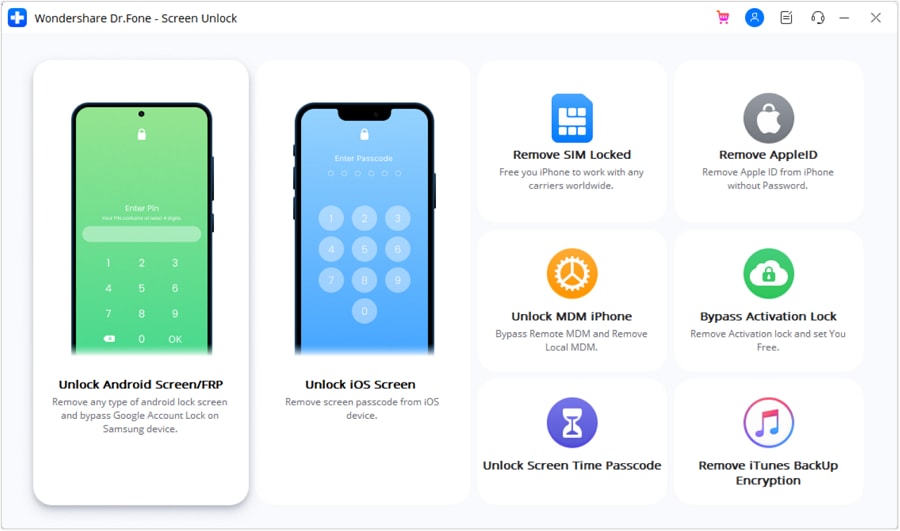
Step 3: Trust the Computer
Open the Apple iPhone 13 Pro Max device and tap on “Trust” over the prompt that appears on the screen. Following this, you need to navigate to the Settings of your device to initiate a reboot.
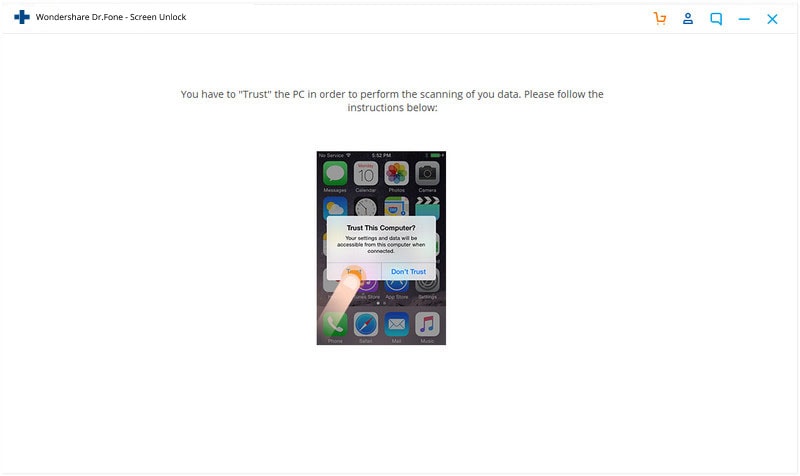
Step 4: Execution of Process
Once you are done with initiating a reboot, the platform automatically detects the update in the process and initiates removing the Apple ID from the Apple iPhone 13 Pro Max device. Once the platform is done with the process, it provides a prompt message in the next window displaying the execution of the removal of Apple ID from your device. This also removes the Two Factor Authentication off your device.
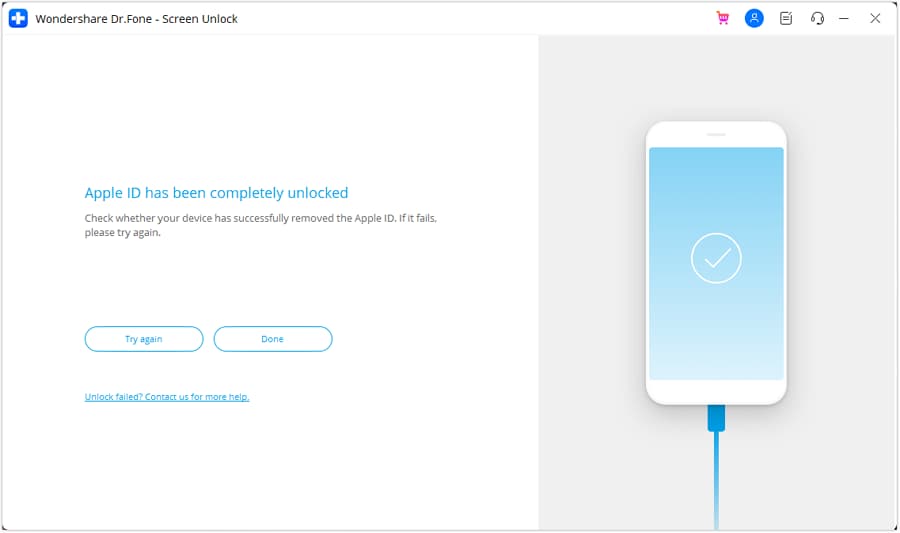
Conclusion
The article has presented a very detailed comparison of the Two Factor Verification and Two Factor Authentication and provided an elaborated discussion over how to turn these security features off their devices. The article also discussed a third-party platform that would guide in removing such security features of the Apple iPhone 13 Pro Max devices over the requirement of the user. You need to go through this article to get a better knowledge of the execution of the mechanism.
How To Remove Phone Number From Your Apple ID on Your Apple iPhone 13 Pro Max?
After getting a new device, iPhone users must prepare a unique identification term for their Apple ID. Creating and setting up this ID is not different each time. Not to mention, one can use this one registered ID to access multiple Apple-based features like podcast subscriptions, apps, etc.
While the code is essential, it can become inactive if your registered phone number is no longer available or your change your number. You must remove the phone number from your Apple ID and add a new one.
Unsure about the steps, though? This post covers that, so read ahead.
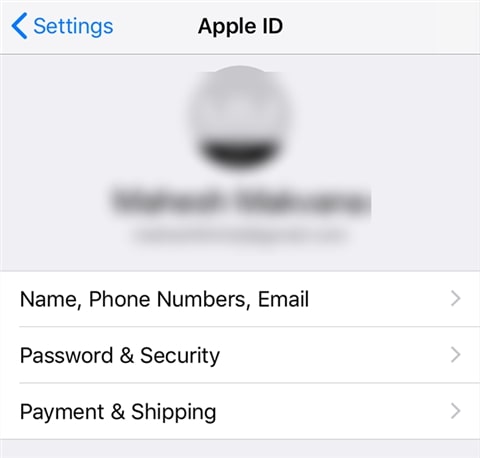
Part 1. What is the Purpose of a Phone Number for Apple ID?
Typically, the email is not linked with Apple ID since the function is linked with phone numbers. Apple services-based communication is passed through the Messages app on the iPad, iPhone, iPod Touch, and the Apple ID.
Registering the phone number to Apple ID will allow you to get the necessary account-related messages on your device smoothly. If you do not sign in to iCloud with a SIM card, using Messages or the FaceTime app will become challenging. So, you need to know how to remove your phone number from iCloud or Apple ID when your registered number is inactive.
Part 2. Can You Remove the Trusted Phone Number from Apple ID?
If you want to learn how to remove the number from Apple ID and if possible, the answer is yes and quite quickly. Apple allows users switching to another carrier to remove their already authorized and linked phone number from the Apple ID. This is helpful for two-factor authentication phases so that the Apple iPhone 13 Pro Max user can avoid getting fully locked out from the account.
Part 3. 3 Ways to Remove a Phone Number from Your Apple ID
If you are wondering about the steps for how to remove an old phone number from Apple ID, there are different styles available. Here are the main processes you can utilize.
Method 1. Remove Phone Number via iPhone/iPad’s Settings
In the matter of how to remove a phone number from an Apple ID, the most effortless process is to go into the Settings app and delete it from there. This is possible if you have your registered phone with you and the Apple ID. Simple access and remove the number.
Step 1: Access the Settings option on your iPad or iPhone device.
Step 2: Tap on the Apple account ID.
Step 3: Reach the Password & Security section.
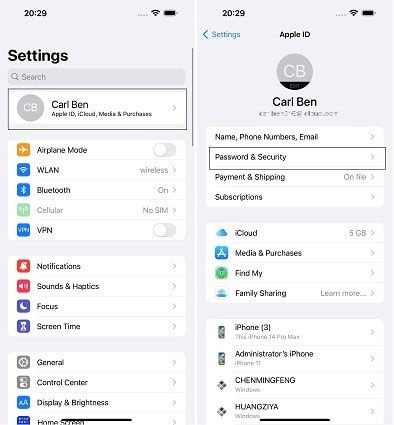
Step 4: You will see the Edit icon on the right-hand side. Click on it and then tap on the “Add a Trusted Phone Number” option.
Step 5: Add the Apple iPhone 13 Pro Max Passcode > new phone number.
Step 6: Select Edit again to delete the old phone number. Press Done.
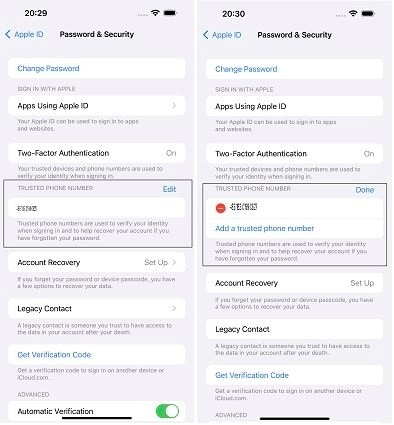
Method 2. Remove the Phone Number Using a Mac
Users can turn the phone number OFF that they registered to Apple ID through their Mac device. In this context, accessing the FaceTime or Messages app is essential in the context of how to remove phone number from Apple ID via Mac steps.
Step 1: Access the FaceTime or Messages app. Sign in using the same Apple ID you use for the apps on your Apple iPhone 13 Pro Max.
Step 2: Go to Messages and tap on the Settings option. Then, choose the iMessage selection.
For Facetime, click on the FaceTime option and go to Preferences > General.
Step 3: From the list, choose the tickmark beside the phone number to uncheck it. That will deactivate the phone number for your account.

Method 3: Remove Phone Number via Change Apple ID Password
It is possible to change the password for Apple ID in the matter of how to remove a phone number from Apple ID. Adjusting the phone number is the natural next step when you carry out this step, so you can remove the number and use another at this stage.
Step 1: On your iPad and iPhone, tap on the Settings menu.
Step 2: Tap on the icon with your name and click on the Password & Security option.
Step 3: Select the Change Password option.

Step 4: The prompt to add the current Apple ID password, or the passcode, will appear. Add it to confirm, and then insert your new password.
Step 5: Hit the Change Password button.
Step 6: You will get logged out of the account. Sign in with the new password, and the phone number will get removed.
Part 4. How to Remove Apple ID without Password?
All the methods mentioned help remove phone numbers associated with the Apple ID but still require you to access the Apple iPhone 13 Pro Max device. What if the Apple iPhone 13 Pro Max device is locked and the necessary details are unavailable, like the password? You can use Dr.Fone - Screen Unlock (iOS) to remove the Apple ID by bypassing the passcode.
It is possible to remove phone number from Apple ID by accessing the Apple iPhone 13 Pro Max device with simple taps through this app. You have to make the Find My iPhone feature active, and the app will bypass the Apple ID password within seconds.
Best Features:
- Supported on various iOS and iPadOS devices.
- Remove all types of lock screens, like Apple ID, Face ID, Touch ID, Screen Time Passcode, etc.
- Fast process of screen and password bypassing.
How to use it?
Step 1: Download/install/launch the app on Mac/Windows. Select Screen Unlock when the app opens on the interface.

Step 2: Choose the “Remove Apple ID” option and add the passcode, as instructed. Allow the system to trust the Apple iPhone 13 Pro Max device for authentication through the following prompt.
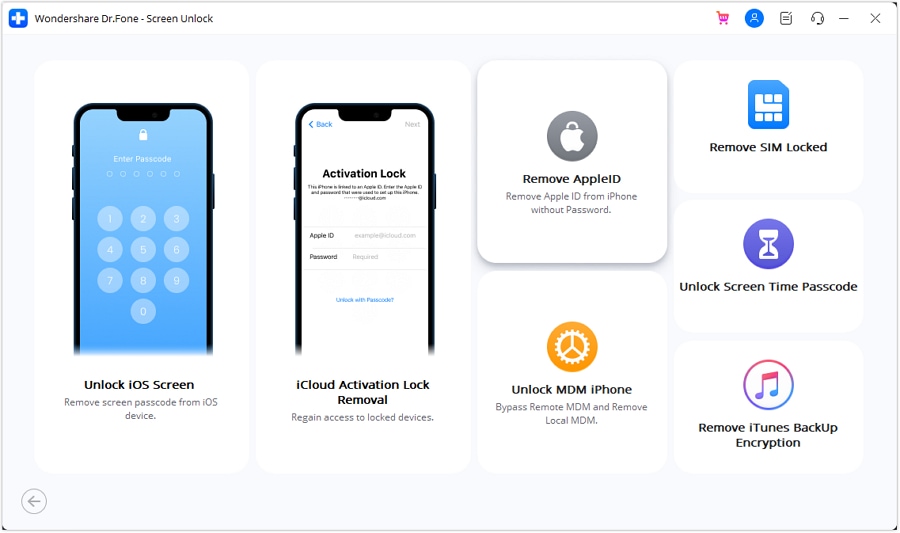
Step 3: Put the Apple iPhone 13 Pro Max device into recovery mode following the on-screen instructions. Then, restart the Apple iPhone 13 Pro Max device. This will automatically kickstart the unlocking process and will take some seconds.
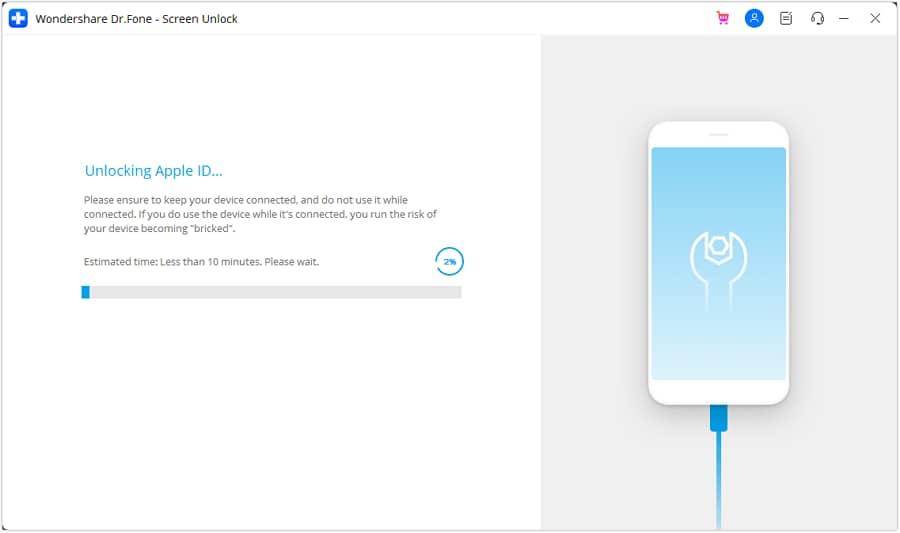
Step 4: Finally, see that Apple ID’s device has been unlocked on the next page.

Video Guide: How to Remove Apple ID without Password?
Part 5. FAQs about Apple ID Phone Number
- How to Add a Trusted Phone Number to Your Apple ID?
The steps for adding the trusted phone number to Apple ID are accessible through Settings > Apple ID icon/name > Password & Security > Edit icon beside the phone number already in use. Click on the “Add a trusted phone number” option and insert the new one. Confirm with your device passcode at the end.
- Why Isn’t My Apple ID Accepting My Apple iPhone 13 Pro Max Number?
Apple ID accepts phone numbers for linking for two-factor authentication. The local number in the region is needed for pairing the number and Apple ID.
- Does Changing Apple ID affect Phone Number?
No, the Apple ID and phone number are not connected as features or codes. So, adjusting the Apple ID will not affect your device’s phone number.
Conclusion
Indeed, there are multiple methods you can take to remove the phone number registered to your Apple ID successfully. They are accessible in multiple ways through Mac, iPad, or iPhone settings. If you forgot the Apple ID, you could even remove it using Dr.Fone - Screen Unlock (iOS) . Ultimately, choose the process to trust based on your specific needs.
How to Fix Locked Apple ID on Apple iPhone 13 Pro Max
Part of why you own and use Apple devices is the reliability of the Apple iPhone 13 Pro Max devices and the ease of using them. This starts with the quality of hardware and the synergy with the software that runs the hardware, and the user experience you get. Apple puts great emphasis on this, and rightly so, for this is one of the keys defining and differentiating factors for people to choose Apple’s iOS over Google’s Android. Like with all good things in life, sometimes, a spanner is put in the works that bring your smooth-sailing life to an abrupt halt. With smartphones playing pivotal roles in our lives today, from payments to internet experiences to getting work done to stay in touch with people, anything that stops us from using our smartphone or endangers that experience is a cause for worry. A locked Apple ID is one such thing. It does not happen frequently, in fact, most users will never experience a locked Apple ID, but for the ones who are fortunate enough to have such a rare experience in life, help is at hand. All you need to do is relax and read on. By the end of it, you will have an unlocked Apple ID and you can go back to cruising.
Part I: Difference Between Activation Lock and Locked Apple ID
Apple being Apple, does a lot to make sure that users get the smoothest experience possible when interacting with their Apple products, both hardware, and software. Yet, sometimes, the messaging gets confusing, and people are not sure what is what. One such thing is the difference between iCloud Activation Lock and Apple ID Lock. While people are more likely to encounter Activation Lock and less likely to encounter Apple ID Lock, they are often confused when they encounter Apple ID Lock and struggle to figure out what that means and how to resolve the issue.
Activation Lock is when your supported Apple device is locked for a number of reasons. The most common reason is a stolen device that was locked by its owner, however, there are other perfectly valid reasons such as an outgoing employee forgetting to sign out and erase their Apple device before submitting it back. The IT department would not be able to reset that device without turning off Find My Apple iPhone 13 Pro Max and Activation Lock on the Apple iPhone 13 Pro Max device.
A locked Apple ID usually happens when the user has forgotten their password to their Apple ID account and attempts to figure out the password have been unsuccessful. Sometimes, Apple ID gets locked automatically under some conditions, and that requires users to reset their password to gain access. A locked Apple ID does not mean that your device is locked for your use. You can keep using it so long as you do not try to use another Apple ID with it since to do that you would have to sign out of your current Apple ID (which is locked) and you won’t be able to do that. On the other hand, Activation Lock renders the entire device unusable till the lock is cleared.
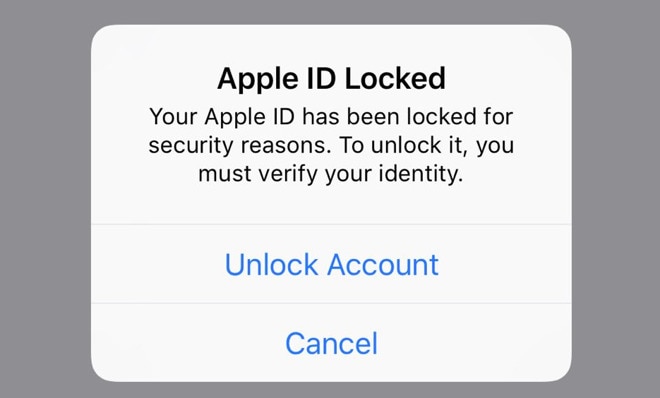
In short, Apple ID Lock is about a user’s account with Apple, akin to how Google Account works on Android devices. Apple ID Lock locks a user’s account with Apple while retaining complete usage of the Apple iPhone 13 Pro Max device whereas Activation Lock locks the Apple iPhone 13 Pro Max device and prevents anyone from using it until the correct credentials are entered. This is about verifying the ownership of the Apple iPhone 13 Pro Max device and works to deter theft of Apple devices.
Part II: Checking If Your Apple ID Is Locked
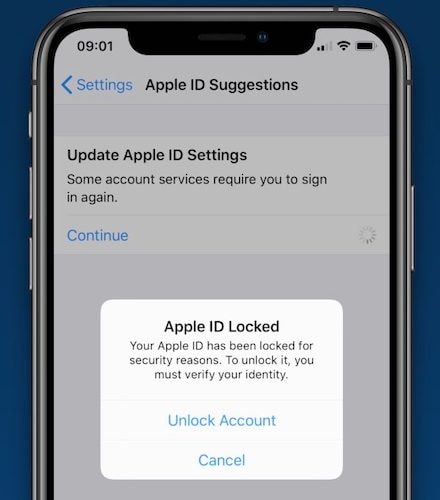
A locked Apple ID is rather unmistakable. Your device would keep telling you that your Apple ID is locked for your security. Your Apple ID could be locked or disabled altogether if someone has tried to gain access to your account (and, obviously, failed). Apple would disable access to the Apple ID unless you are able to prove rightful ownership and reset the password successfully.
Part III: Reasons for Locked Apple ID
There can be a few reasons why your Apple ID is locked. You forgot the password and now it is locked since you entered the wrong password too many times. A scarier prospect, albeit a real one, is that some malicious actor attempted to login into your Apple ID account but failed. Had they succeeded, you would have gotten a message that ‘your Apple ID is being used on another device’ now.
Apple does a lot to ensure that your Apple ID remains safe. You trust Apple with a lot of your data, including financial data by way of your credit cards associated with Apple ID to make purchases on the App Store and iTunes Store. Therefore, some of the time, Apple preempts issues by proactively locking up your Apple ID or even disabling it. It goes without saying that sometimes it is something so simple as a software error that is believed to have locked up Apple IDs for many users around the world a while ago. It is also entirely possible that it was some malicious actor probing the servers for accounts.
All of these will result in a locked Apple ID that users will have to reset their password to in order to gain access back.
Part IV: How to Unlock Apple ID on Apple iPhone 13 Pro Max
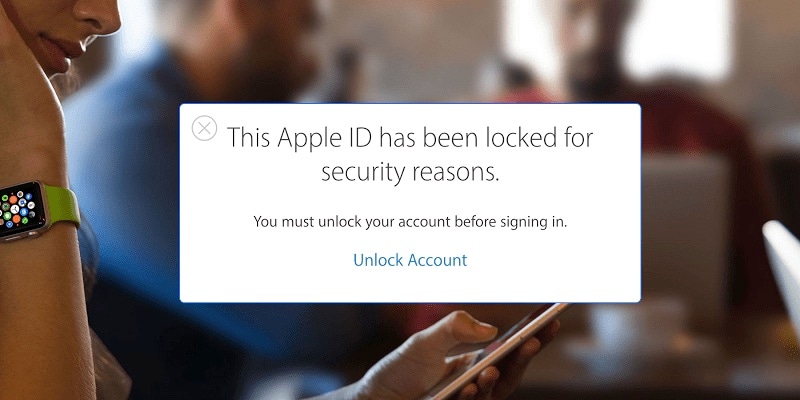
It is unfortunate you are facing a locked Apple ID. Apple tries its best to make users aware of safety protocols they need to follow to minimize and mitigate such unfortunate occurrences, such as using two-factor authentication, trusted devices, trusted phone numbers, passwords, passcodes, etc. that serve as deterrents to prevent unauthorized access to devices and accounts. Yet, when the unfortunate happens, what to do?
IV.I: Unlock Apple ID Via Two-Factor Authentication
Apple implemented two-factor authentication a long time ago to prevent unauthorized access to Apple ID accounts. If you have it enabled, you would be able to use two-factor authentication to unlock your Apple ID again.
Step 1: Go to https://iforgot.apple.com .
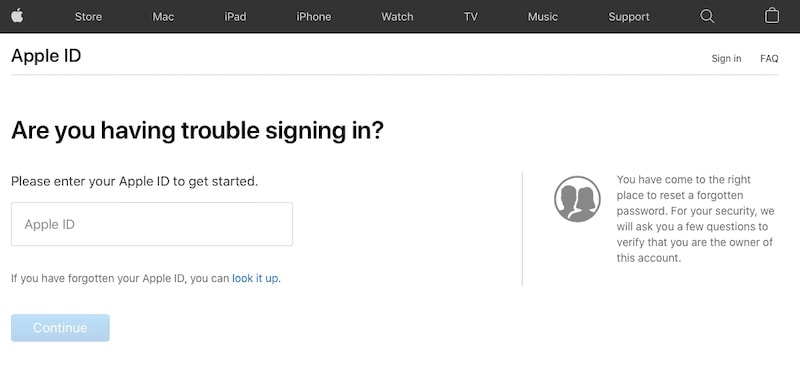
Step 2: Key in your Apple ID and proceed.
Step 3: Confirm your mobile number associated with the Apple ID.
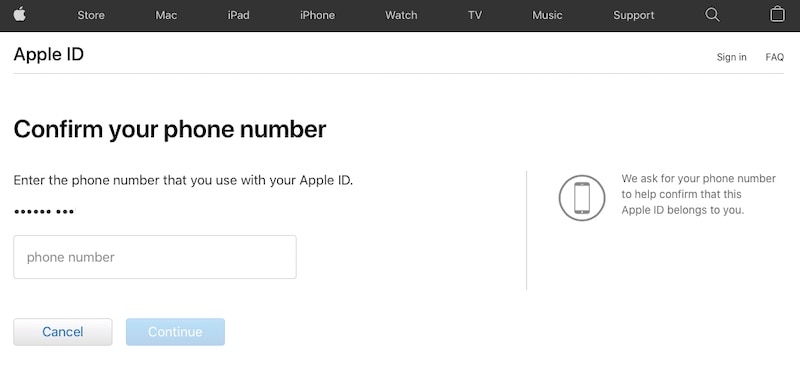
If you have another device associated with the Apple ID and it is a trusted device, you can now receive instructions to proceed with a two-factor code on that device.
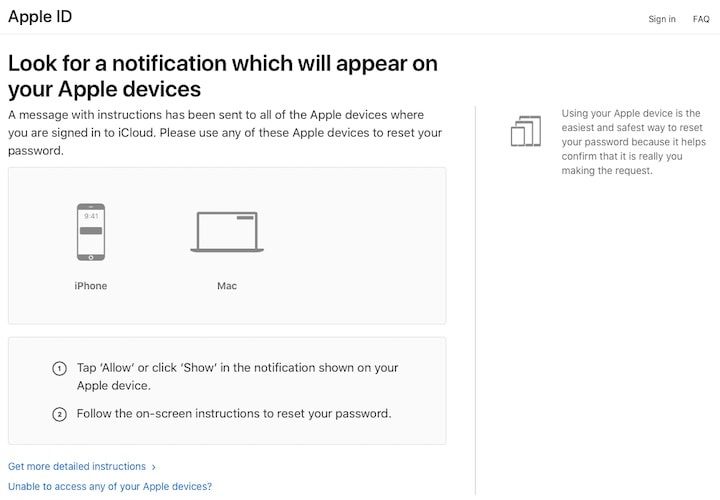
Step 4: Use that code to unlock your Apple ID using two-factor authentication.
IV.II Unlock Apple ID Via Dr.Fone - Screen Unlock (iOS)
Dr.Fone is a name that will be instantly familiar to anyone who has ever had any issue with their mobile devices and would be able to vouch for the quality and efficacy of this software at fixing issues quickly and efficiently.
Dr.Fone is a collection of carefully crafted modules that helps you when most needed. Ranging from helping you wipe your devices securely with Data Eraser to maintain your privacy when you sell your device or give it to service and helping you erase not just junk on your device but also user data such as SMS (whether single or batch) to free up some space on your Apple iPhone 13 Pro Max, to Phone Transfer that helps you to easily transfer data you’re your old phone to your new Apple iPhone 13 Pro Max including restoring from iCloud Backups, Dr.Fone is a venerable utility from Wondershare that does it all and lives up to its name. Naturally, this tool was designed to help you unlock your Apple ID as well.
Step 1: Download Dr.Fone.
Step 2: Launch Dr.Fone and select the Screen Unlock module.

Step 3: Click Unlock Apple ID to start the process.

Step 4: Connect your device to the computer and wait for Dr.Fone - Screen Unlock (iOS) to detect it. You must know the passcode of your device.

You will be asked on your Apple iPhone 13 Pro Max to Trust the computer, and then you will need to enter the passcode.
Step 5: Unlocking Apple ID via Dr.Fone - Screen Unlock (iOS) will erase the contents of the Apple iPhone 13 Pro Max device. You need to confirm this by typing six zeroes (000 000) in the popup.

Step 6: Follow the on-screen instructions to reset all your settings on the Apple iPhone 13 Pro Max and then reboot to start the unlocking process.

Dr.Fone - Screen Unlock (iOS) will notify you when the process is complete.
Part V: Conclusion
Considering how much the Apple ID is pivotal to our Apple experience, it can be incredibly unnerving to realize that it is locked or disabled, due to any reason. We use our Apple ID for iCloud services on Apple devices, to make purchases on iTunes Store and App Store and payments using Apple Pay. Apple knows this and has checked in place to make sure that only you are in possession of your Apple ID account at all times. It can cause a little hassle at times, since if someone makes multiple failed attempts to gain access to your account, Apple will lock your Apple ID until you can unlock it with proper verifications and reset your password.
Also read:
- 10 Best Picture Organizers for Striking Grids for 2024
- 2024 Approved Transmit Live Camera Feed Using VLC Media Player
- Boosting Connectivity: In-Depth Review of the Netgear AC120er (EX6200) Wireless Range Extender
- Download Updated HID-Compatible Mouse Software Today
- Effortless Download & Installation of Updated AMD SMBus Drivers - Now
- How to Change/Add Location Filters on Snapchat For your Motorola Edge 40 | Dr.fone
- How To Delete iCloud Account Remove Your Apple ID Permanently From Apple iPhone 11 Pro
- How To Fix Apple ID Verification Code Not Working From iPhone SE (2020)
- How To Fix Apple ID Verification Code Not Working On iPhone SE (2022)
- How To Unlink Your iPhone 8 Plus From Your Apple ID
- In 2024, A Step-by-Step Guide to Finding Your Apple ID From Your Apple iPhone 13 Pro Max
- In 2024, Forgot Your Apple ID Password and Email From iPhone 13 mini? Heres the Best Fixes
- In 2024, How to Fix when Apple Account Locked On Apple iPhone SE (2020)?
- In 2024, Top-Notch Solutions for Disabled Apple ID From Apple iPhone 14 Pro Making It Possible
- In 2024, Ultimate Guide from Samsung Galaxy A25 5G FRP Bypass
- Israel Is Widely Believed to Possess Nuclear Weapons but Has Not Declared Them Publicly nor Joined the NPT as a Nuclear-Weapon State
- Pokemon Go Error 12 Failed to Detect Location On Motorola Edge 40 Neo? | Dr.fone
- Solved: Navigating Windows 11'S Boot Configuration for Beginners
- Turning Off Two Factor Authentication From iPhone X? 5 Tips You Must Know
- Title: Turning Off Two Factor Authentication On iPhone 13 Pro Max? 5 Tips You Must Know
- Author: Alma
- Created at : 2024-11-13 22:57:59
- Updated at : 2024-11-17 04:08:09
- Link: https://apple-account.techidaily.com/turning-off-two-factor-authentication-on-iphone-13-pro-max-5-tips-you-must-know-by-drfone-ios/
- License: This work is licensed under CC BY-NC-SA 4.0.